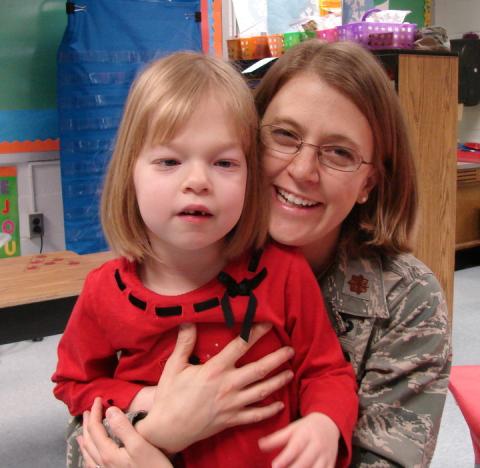
#MilitaryMonday: A Pattern Of Malfeasance: The Department Of Defense’s Treatment Of Special Needs Military Kids
"If you’re going to sin, sin against God, not the bureaucracy; God will forgive you but the bureaucracy won’t." ― Hyman Rickover, Admiral, USN, (1900-1986)
Admiral Rickover is considered the father of the Nuclear Navy, a fleet of nuclear-powered submarines and ships he helped create. Rickover is famous for taming the Navy’s bureaucracy; finding ways around, over and under incompetence and status quo-ism. Frankly, our country needs more leaders like Rickover, particularly in the Military Health System (MHS), and specifically in the healthcare and family support for our Exceptional Family Members (EFMs), military families impacted by disabilities and chronic/complex medical conditions. While medical reform for our veterans has captured the nation’s attention, reform has been slow to come to the Department of Defense (DoD), leaving our most vulnerable military children at risk.
Over the last couple of years, a small cadre of these military families, along with advocacy organizations, like those in the TRICARE for Kids Coalition, have pushed DoD to enhance its services and supports for these unique military families. Here is a brief history of just some of the issues we continue to fight with the entrenched bureaucracy of the Pentagon:
Military Families Impacted by Autism
- June 2012: Senate Armed Services Committee hearing on a host of issues related to EFMs, with a significant focus on autism. The military family stories submitted and my testimony provide a window into our daily lives and the way our legislators can help.
- August 2012: Military families with autism win a class action lawsuit against DoD. The Court finds that the Agency’s decision to deny coverage for a recommended autism therapy as a medical benefit is “arbitrary and capricious and not in accordance with the law.” While the class action aspect is eventually cancelled, the case is remanded to DoD for correction and implementation.
- 2013: DoD implements a number of ludicrous regulations that would have halted therapy services for thousands of children with autism, forcing the families and advocates to fight back.
- 2014: DoD decides to cut reimbursement for TRICARE autism providers in half. The ensuing wait lists and access challenges cause another uproar.
- 2016: DoD cuts provider rates again, further exacerbating access to care, after which senior military leadership urgently calls on the Office of the Secretary of Defense to reverse the cuts highlighting “access to care...effect[s] both family and unit readiness” and “capacity of ABA [therapy] services cannot meet the current demand.” DoD fails to course correct, so Congress intervenes and orders the rate cuts reversed.
- 2017: DoD institutes a new set of policies requiring all children obtain a new autism diagnosis every two years and IQ evaluations to assess ongoing care. Military developmental pediatricians (experts in diagnosing autism) were not given an opportunity to provide input to the policy that directly affects their patients’ care and subsequently send a letter to the Defense Health Agency (DHA) stating the “Required testing as proposed by TOM [TRICARE Operations Manual] is not standard of care, expensive and time-consuming.” To read more, see: Military Autism Families Fear Loss of Services Amidst Policy Changes.
I believe those who review this timeline objectively will scratch their head and ask, “Who is making these asinine policy decisions, and why has this been allowed to continue year after year after year?” Simply put, the absence of sustained and comprehensive leadership oversight of essential medical care and support for military children with special needs has led to a series of public missteps that erode faith in the system and negatively affect outcomes. Families that already shoulder tremendous responsibilities feel assaulted and given the number of threats to their child’s continued services, question the Defense Department’s intent. And that is just one example.
Hospice Care for Military Children
It should shock you that military families, whose children have terminal illnesses, are receiving recommendations not to elect hospice care because of the inappropriate manner in which DoD is providing that care. Inexplicably and contrary to best medical practices, the military’s hospice benefit “will not pay for a terminally ill child’s hospice services unless the parents agree to give up coverage for further curative care.” This article by the National Military Family Association (NMFA) continues, “kids are different. Life-limiting conditions in children can be unpredictable. The guidelines used to make adult hospice decisions don’t apply.”
The TRICARE for Kids Coalition, of which NMFA is a part, recently discovered that the DoD had been told that military children should receive comprehensive hospice care and callously ignored the recommendation. A study, called the “Children’s Hospice Department of Defense Report”, completed in 2007 under contract with the Henry M. Jackson Foundation for the Advancement of Military Medicine, found:
Children with life-threatening conditions (LTC) who are entitled to services from the Military Health System (MHS) do not receive care in the comprehensive pediatric palliative care and hospice model called for by the Institute of Medicine, Medicaid, the Childrens’ Hospice International, and the National Quality Forum.
Recently, when officials in the Military Health System were asked how many children were impacted, they assured advocates that the numbers amounted to perhaps a handful. However, the DoD study stated “An estimated 4000 children with LTC [life-threatening conditions] are eligible for medical care through the MHS each year. Approximately 400 of these children die each year.”
This ought to be a national embarrassment. If DoD’s numbers are accurate, in the decade since the hospice study was published, roughly 4000 military children died without proper end-of-life care. The question that is startlingly tragic, “how did this DoD study sit on a shelf unacted on for the better part of the last decade?”
Extended Care Health Option
Living a military life while raising a child with a disability presents extraordinary challenges. This truism has been recognized by the Congress in a program called the Extended Care Health Option (ECHO). A 1992 GAO report noted the program:
was established to provide additional financial support to families of active duty personnel in recognition of (1) the high cost of caring for seriously disabled family members and (2) the limited access to care for many specialized services because of long waiting lists for public services and state and/or local eligibility restrictions (such as residency requirements), which adversely affect military personnel.
In January of 2015, one of the fifteen recommendations from the Military Compensation and Retirement Modernization Commission (MCRMC), tasked by Congress with rethinking military pay and benefits, was related to the ECHO benefit: “Improve support for service members’ dependents with special needs by aligning services offered under the Extended Care Health Option to those of state Medicaid waiver programs.” The MCRMC, noting that DoD already had the authority to make these changes without legislation, said
As evidenced by the similarity in benefits authorized under the HCBS and ECHO programs, as well as the directive to use state and local services before accessing ECHO, the Congress intended ECHO as an alternative to unavailable waiver benefits. Yet ECHO benefits, as currently implemented, are not robust enough to replace state waiver programs when those programs are inaccessible to Service members and their EFMs. With the exception of home health care services and ABA therapy services, the ECHO program is not highly utilized. This is due to a lack of needed services.
In an April 2015 letter to President Obama, then Secretary of Defense Carter endorsed the MCRMC recommendations. Since then, with exception of one small change in policy, efforts to implement these recommendations have stalled within the Defense Health Agency.
Please understand this list considers only three of the top issues facing our special needs military families. These examples are necessary to tell the story of the pattern of misalignment of programming for children’s health needs. Other problems exist with military pediatric healthcare, the Exceptional Family Member Program (EFMP), military kids and special education, and even the most basic civil rights of military families. Despite briefings to the White House, Congress, and DoD over the last number of years, the trajectories for each of these examples are similar; families are embattled rather than empowered, military readiness and morale suffer, and these military families feel forgotten.
In a recent Military.com interview, Michael Higgins, one of the MCRMC Commissioners, lamented,
Now I don’t know how a lot of these decisions get made over in the Pentagon. But I believe once they are made they are carved in stone somewhere over there. I don’t care if the President changes, the Secretary of Defense changes, their attitude [in DoD] is not changing.
This is as good an explanation as any for why special needs military families continue to face barriers. DoD senior leadership, even if supportive of change, aren’t making decisions to get the job done nor helping their staff see the issues through to completion. It’s the bureaucracy, three or four levels down, who is making decisions and implementing policy. And while inappropriate policy kills less efficiently than a failed seal or a valve out of place on a submarine, the result is the same.
Our military families need their leadership, both civilian and military, in the White House and in the Pentagon, to step up and tackle these problems. Until senior leadership makes it clear that the status quo is no longer acceptable, their intent is known with respect to addressing the needs of our most vulnerable families, and insists on accountability by setting forth responsibility and a timeline, our families will continue to scrap and brawl for the right care by the right providers at the right time for our kids. These are our kids. What other choice do we have?
This post originally appeared on the Huffington Post in February.



The views and opinions expressed in this post are those of the author(s) and do not necessarily reflect those of MomsRising.org.
MomsRising.org strongly encourages our readers to post comments in response to blog posts. We value diversity of opinions and perspectives. Our goals for this space are to be educational, thought-provoking, and respectful. So we actively moderate comments and we reserve the right to edit or remove comments that undermine these goals. Thanks!